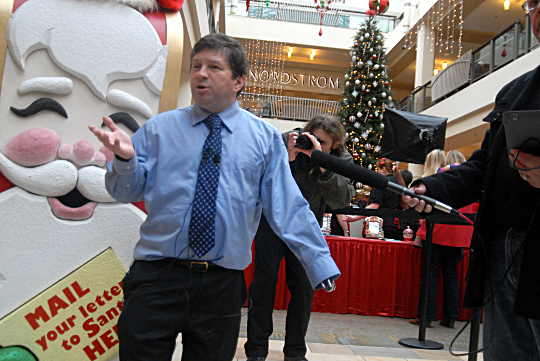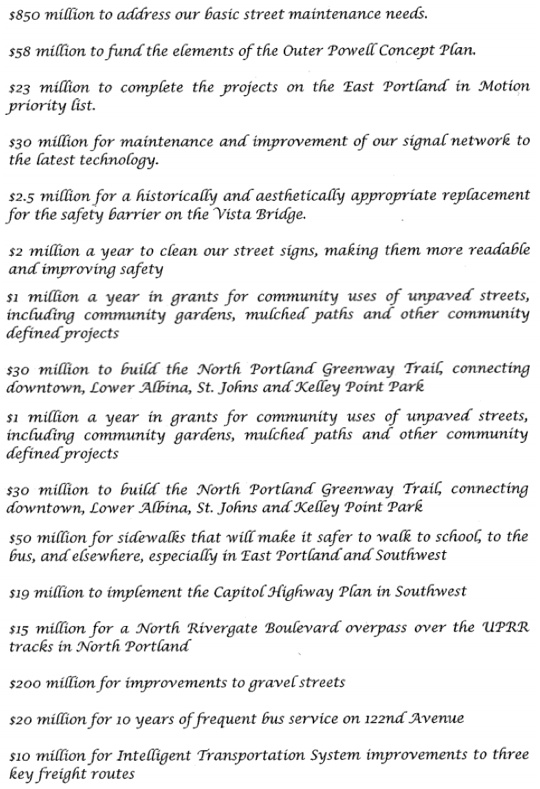
transportation funding inside the Lloyd Center Mall on Thursday.
(Photo by M.Andersen/BikePortland)
Saying that “repetition, repetition, repetition” is the way to get the message to voters that Portland needs more money for street repairs and improvements, Transportation Commissioner Steve Novick held a press event Thursday to formally ask Santa for help.
“We know that people are tapped out, and it’s going to be a big lift to ask people for more money,” Novick said. “So we want to demonstrate in both serious and playful ways that we’re doing everything we can to avoid having to ask people for more money.”
So Novick stopped by Lloyd Center Mall Thursday to mail a letter to Santa Claus with a wishlist of $1.3 billion in street projects, about $1 billion of it for paving and maintenance and the rest for a combination of improvements to multimodal transportation and freight mobility.
“We made a list,” said Novick, who oversees the city’s transportation bureau. “We checked it twice. We explained that we’ve been a very good city — we’ve adopted efficient ways of using our existing transportation dollars.”
We’ve pasted the list from the letter below. It includes 14 separate projects including $30 million to build the “North Portland Greenway Trail” to $200 million to fund, “improvements to gravel streets.”

After the photo op, Novick moved quickly to serious business, acknowledging that the city is about to ask the public for money — though not nearly that much — but saying that first it’s trying every other trick in the book.
“The truth is that all of us use the roads, so I think there’s a pretty strong argument that all of us should pay for it.”
— Commissioner Steve Novick
Novick talked up the possibility that we reported last week seems to be the city’s top prospect: a fee of several dollars per month on every household and on most local businesses.
He also mentioned that a local gas tax or an income tax surcharge “get kicked around” but said a gas tax is “not necessarily the option that would be on the top of our list.”
Novick suggested the city doesn’t have time to wait for the state to reform its own transportation revenue system, and said he expects that whenever it presents the public with a plan for new revenue, it’ll arrive with a list of projects attached.
“We would come up with a list of the specific projects we know we would fund,” Novick said. “You don’t say, 10 years out, ‘Here’s how we spend every dime,’ because needs change over the course of several years. But definitely we would identify some specific projects.”
I asked Novick to respond to concerns that a per-household fee is unfair to people who get around largely with bicycles, because their damage to the streets is negligible.
Novick responded that although someone who rides a bicycle is saving everyone money by lowering local health premiums, “the truth is that all of us use the roads … so I think there’s a pretty strong argument that all of us should pay for it.”
Novick used sidewalks, public transit and street paving, roughly in that order, as his examples of how new money should be spent. He didn’t mention bicycling until asked about it, although he mentioned the East Portland in Motion plan, which includes various upgrades to bicycle infrastructure east of 80th Avenue as well as many crosswalk and sidewalk projects.

(Photo by J.Maus/BikePortland)
“These transportation investments really matter to people,” Novick said of recent sidewalk improvements in East Portland. “We get testimonies from citizens saying things like, ‘It used to take me 45 minutes to walk to the bus because I had to walk through the mud, and now I can get there in 20 minutes.'”
Novick said the death on Tuesday of Vijay Dalton-Gibson while crossing 117th and Glisan, at an intersection where the city had identified the need for a rapid-flashing beacon, showed the depth of Portland’s problem.
“We know there’s a need, but we just don’t have the money,” Novick said. “It’s really depressing.”
He said the city government shares some responsibility for the situation.
“To tell the truth, the city has recently made some investments in things that were important, like rebuilding the Sellwood Bridge, which they were important things to do, but we didn’t really have the money to do them. so we’ve been falling farther behind on things like basic maintenance,” Novick said. “So unless the streets are going to continue to crumble and these important safety needs are going to go unaddressed, we’re going to need to find some other ways to find it.
“We realize it’ll take a lot of explaining and a lot of back and forth,” he added.
Once the city completes this back-and-forth, will it emerge with a list of ways to reduce its future street costs by making biking appeal to more people? That remains to be seen.
